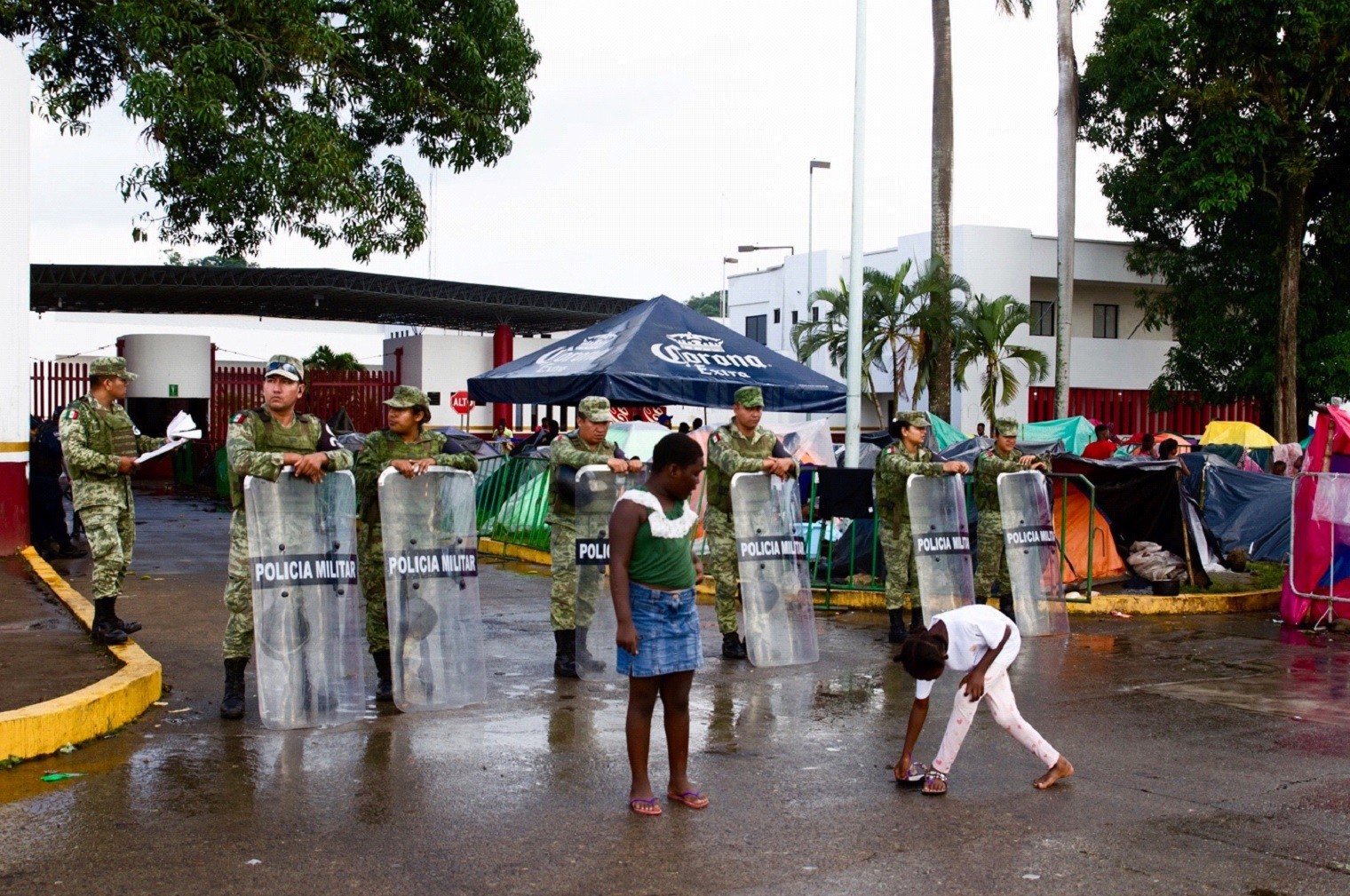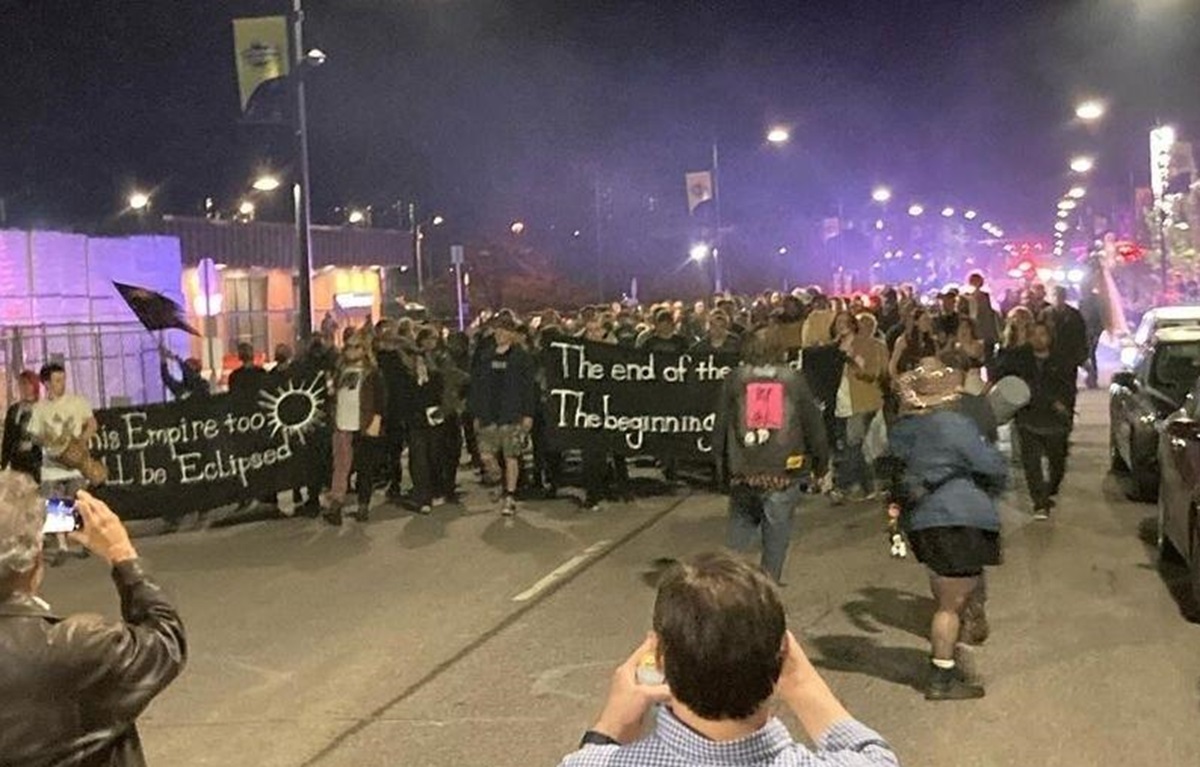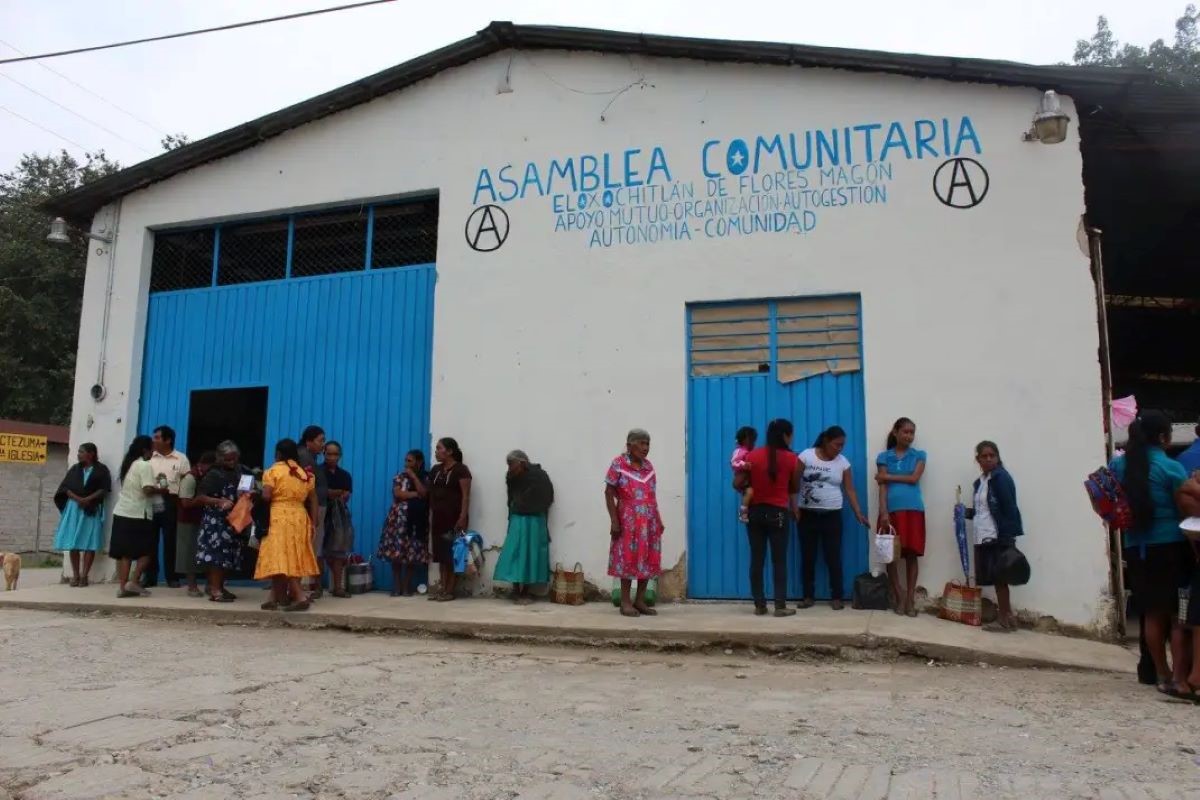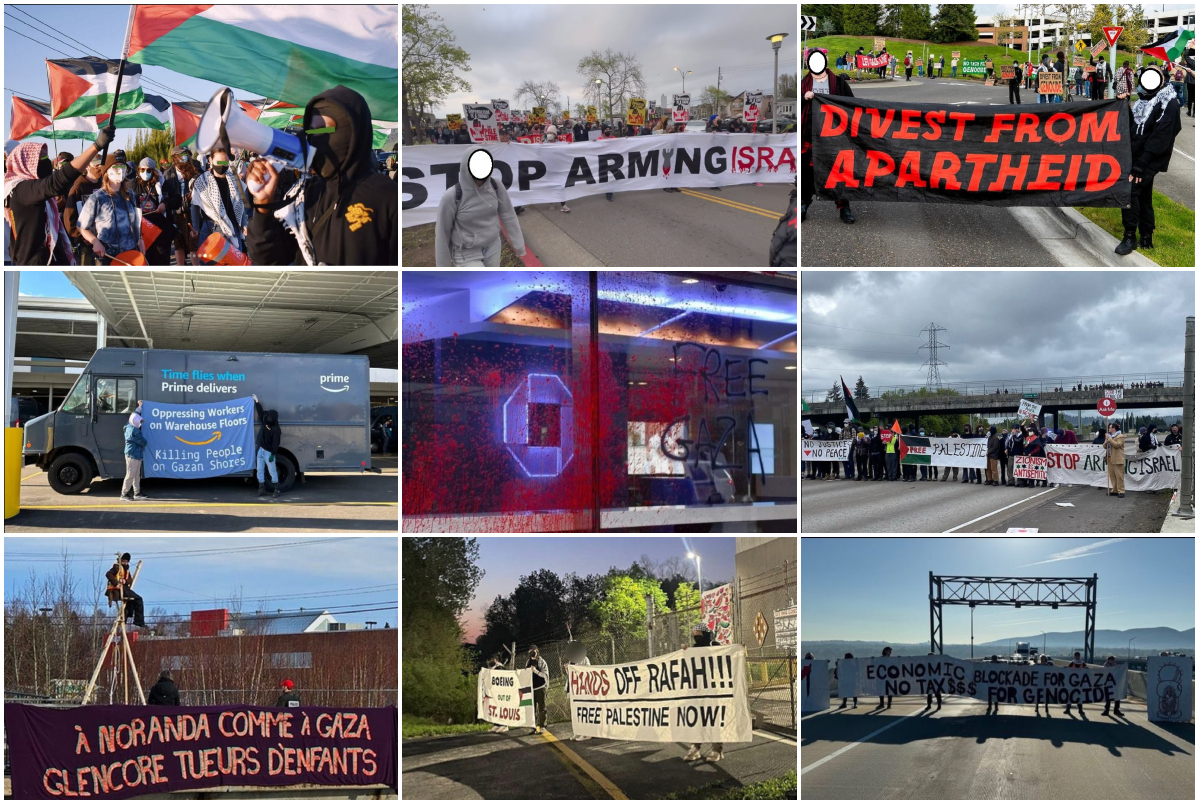Filed under: Analysis, Immigration, Repression, Southern Mexico

Report from Tapachula Solidarity on the horrific conditions faced by migrants stuck at the Guatemalan/Mexican border, the impact of new US border policies, ongoing migrant resistance and self-organization, and how people can help as a new caravan is organized. For background, check out this episode of This Is America.
Content warning following photo: migrant street theater of slavery scene.
Since October 2019, our collective, Tapachula Solidarity, has been providing critical resources to migrants in Tapachula, Chiapas, a small city on the southwest end of the so-called Guatemala-Mexico border. The migrant population in Tapachula has been one of the most heavily affected by the implementation of new migrant laws jointly created by the Trump administration and Andrés Manuel López Obrador (AMLO), president of Mexico.
Before summer of 2019, when arriving in Mexico through the Guatemalan border, US asylum seekers could wait in line to apply for a humanitarian visa which they would then usually receive that same day. At high points during large caravans the wait could take up to two days. With this visa they could continue to travel, work and live in Mexico for a year, with the option to renew after that. However, this past spring, Trump led a full out crack down on the Mexican government by pushing stricter immigration policies. Mexico avoided Trump tariffs by agreeing to drastically lengthen the process to receive a humanitarian visa and initiated mass deportations and arrests, while increasing the number of checkpoints and dispatching 6,000 national guard members to the Guatemalan border.
Help us boost this important solidarity project with the African migrant led protest camp in Tapachula, Mexico. Spaces of autonomy are critical to sustain within the border regime. You can find more information on the Go Fund Me and video belowhttps://t.co/v0r0o2MB5X
— ????????? (@commotion_world) November 15, 2019
With this repressive action taken by the National Guard to eliminate refugees from Mexico, a huge crisis was building, particularly in Tapachula, Chiapas. During the summer months of 2019, no form of paper that would allow migrants to travel farther north in Mexico was being given out, bringing the entire process to a complete standstill. After a grueling and dangerous passage, Indigenous, African, Caribbean and Central American refugees arriving at Mexico’s southern border were now being denied humanitarian visas and travel visas needed to transit the country to get to the US border. Along with being denied documents, the National Guard worked with Immigration to overcrowd the Siglo XXI (21st Century) migrant detention facility. Having a capacity of 960 people, the detention was now sometimes holding over 3,000 people including many children.
Siglo XXI has the reputation of being the largest immigration facility and one of the deadliest in Latin America. This past spring, 1,300 people broke out and escaped Siglo XXI, creating the largest mass escape from a Mexican immigration center in memory, demanding space to lie down and edible food to eat. The atrocious conditions inside of Siglo XXI have led to uncounted deaths, suicide attempts with some successes and fatal illnesses, particularly for young babies with weak immune systems being held inside the women’s section. There are numerous reports through human rights organizations and detainees that the medics have refused to touch Black babies, denying food and sleeping space for the Black detainees, and locking Black families into rooms at night while not doing so to others inside the center. There are many known incidents of migrants dying while being held inside of Siglo XXI. While some are reported and can be found on the internet, most are hidden from the public and are just talked about amongst first hand witnesses and buried in Human Rights reports that were submitted to the Instituto Nacional de Migración (INM) but never published. While inside Siglo XXI, a member of our collective personally witnessed the death of a Black Haitian baby who was denied medical care while his mother was screaming for help out of her locked room in the middle of the night.
Many migrants are detained and brought into Siglo XXI while they are in the process of applying for their temporary refugee card, which allows them to remain in Tapachula for a given number of days (generally 20-40 days) to then be told to re-new their card if they want to continue to stay in Tapachula (but not leave the city limits of Tapachula) legally. At this point of renewal, migrants are sometimes told they must go back into Siglo XXI where they must wait again inside the center. In some cases, renewal attempts are completely ignored and they are brought back inside the center only to be deported. Many migrants inside of Siglo XXI are not given the opportunity to apply for refugee status in Tapachula and are arbitrarily deported by bus or plane back to their countries without any explanation. While there are signs posted inside the facility which state the legal rights of the detainees such as; you must be given a lawyer and access to a translator in your first language when communicating with INM or an attorney and given access to complete and adequate medical care, these rights are actively ignored and neglected.
Throughout the summer and fall months of 2019, as conditions grew more oppressive in Tapachula and the document process had come to a complete halt, migrants banned together to fight these unjust actions coming from the US and Mexican government. Outside of Siglo XXI, a large group of migrants set up a protest camp, which at its highest point had a few thousand families living in tents without any access to food, water or bathrooms. The group organized an African Assembly, designating a leader from each African country to participate in group meetings that led to a series of protests where migrants came together taking creative action, re-creating scenes of slaves being dragged on chains, taking over the streets of Tapachula by the hundreds, holding riot lines with the National Guard in front of Siglo XXI and holding down their permanent protest camp for months. The protests were often met with severe violence and beatings of the protestors by federal police and the National Guard. On one occasion a federal cop was seen putting a body that the cops had beaten to death into a bush down the road from the protest camp.
Migrants continue to wait in Tapachula living on the streets and seeking any kind of work to keep themselves and families alive, but few jobs exist due to racism and lack of papers. Many women resort to working the night-shift at bars and sex work in the streets where human trafficking and kidnapping is rampant. Many of those who came with money have turned to coyotes and smugglers who are able to pay off Mexican officials and avoid checkpoints while traveling north to the US border. This does not always go well, as many die along these smuggler routes including a group of Cameroonians who paid to be transported via boat.
After becoming frustrated with unmet demands and living in sometimes fatal conditions, a group of migrants organized a caravan to leave Tapachula and start traveling north with hopes of getting to the US border. On the morning of October 12th, a caravan over 2,000 people who had been residing on the streets of Tapachula for months began to walk north on the highway to Huixtla for about 20 miles. The majority of people walking in the caravan carried no documents or just documents for 20-40 day permission to stay in Tapachula. By evening, hundreds of National Guard and federal police created riot lines and road blockades with the intention to stop everyone walking north in the caravan. This caused many people in the caravan to run into the nearby wilderness, some becoming separated from their friends and family. Over 1,000 people were put on government buses and taken to Siglo XXI, while others continued going north through the forest or found their way back to Tapachula by themselves. Hundreds of those who were sent into Siglo XXI were deported within the next two weeks while some were given the opportunity to continue their refuge in Tapachula.
Many of those seeking refuge have recently been able to receive permanent resident cards, allowing them to live anywhere in Mexico, but then very much limits them from seeking asylum in the United States. At some points, humanitarian visas are made available for a large fee and are sold and given out in a seemingly arbitrary manner. With these recent events, the protest camp of what was once 3,000+ refugees sleeping, living and protesting outside of the Siglo XXI detention, has been cleared and emptied by officials. This photo, taken on December 17th, shows the space outside of Siglo XXI that was once home to thousands of migrants, their tents and the huge riots that took place this past summer and fall by asylum seekers from all over the world.
Since the attempted caravan on October 12th that got shattered by national guard and military officials, the numbers at the protest camp were dwindling. Almost the entire camp left with the caravan and were then deported or taken to detention. A few hundred stayed behind at the camp, mainly women and children who were still running communal kitchens and watching after the children. After the caravan catastrophe, many of those who had remained at the protest camp were accepted for Mexican refuge and continued traveling north which left just a few families at the camp whom were cleared out by officials. The space has since been cleaned and now only holds the memory of thousands facing off against the national guard and filling the streets fighting for survival.
While the time of the protest camp and weekly riots in Tapachula has come to an end, no one will forget the immense impact that the African Assembly and black migrants led throughout the immigrant justice movement as a whole and the future that it helped pave for our next generations.
Humanitarian visas are still not being given out. Permanent residency cards (Mexican Refuge) cards are being processed at a slow rate and many are choosing to apply through COMAR or voluntarily go into the Siglo XXI detention center (nicknamed the deadliest detention center in Mexico) just to be allotted 20-40 more days of legal stay in Tapachula at a time. This has been made the current wait time in Tapachula, Comitan, Palenque and the Mexican Cities of the Guatemalan border about 3-7 months. While many more have recently been allotted permission and the migration flow north has opened back up again, it’s estimated that there are still thousands trapped amongst these cities on the Guatemalan border, in a standstill for unknown amounts of time, and the need for mutual aid, solidarity, resistance and monetary support is dire.
We are a group of grassroots autonomous organizers, with US and/or Mexican citizenship who have experienced detainment ourselves in Siglo XXI, worked closely with migrants living in the Siglo XXI protest camp & riots and have been engaging in migrant justice centered mutual aid projects for years now. Our goal is to work in solidarity with migrant-led resistance and engage in mutual aid relationships and projects that help elevate the most urgent survival needs of migrants. This past October we committed to having organizers from our collective on the ground in Tapachula to facilitate mutual aid and continue to capture photos and footage to push into social media and raise awareness about the situation at hand.
Mutual Aid work is beautiful and complicated. Over the last few months we have been crowdsourcing to directly allocate funds to those suffering the most from living within the terrible conditions of Siglo XXI and the refugee crisis in Tapachula. We’ve rented and helped organize communal houses and transportation for migrants who are sex workers, trans womxn, queer, black, indigenous, single mothers, minors and protestors. We’ve organized to have the bedding, kitchen appliances and personal items available in these houses as needed. We’ve worked with a building in the center of Tapachula to set up a communal kitchen that any migrants who are in need can use 24/7 to cook their own food with shared appliances and dine in a safe atmosphere. In the same building we’ve built a zine library and reading area with multiple different languages available. We’ve worked tirelessly to print materials, have conversations and give out factual information about the entire migration process of every step between so-called South America to the US. We organized communal meals during the holidays to bring people together from all over the world and inspire hope and community in a time of fear and waiting.
This past December at the Zapatistas Encuentro, amongst hundreds of other femmes from Rojava to Palestine to Italy to Guatemala, we committed to building a global network of refugees, migrants and accomplices that will center the survival and leadership of migrant femmes. This means centering the survival and leadership of Indigenous womxn, Black womxn and LGBTQ+. This means centering the leadership of Indigenous stewardship of mother earth and recognizing the migrant crisis as a consequence of climate change and human exploitation of earth. This means incorporating mutual aid with migrants and the destruction of borders into our communal fight for liberation.
We are currently writing to you as part of our collective is accompanying the refugee caravan that left San Pedro Sula, Honduras this morning in an attempt to get to the US. The horns sounded at 4 am this morning in the San Pedro Sula plaza to abruptly awaken over a thousand people to start their effort in getting to the Guatemala border by tonight. Last night celebrations and public statements were made about the conditions in Honduras forcing people to take this brave journey. The group held a communal prayer and dozed off for a few hours before barreling north. Many hitched rides this morning and have broken up into smaller groups and are still currently in transit. Locals have been providing water, snacks and transportation to those in the caravan. There are many mothers traveling with sick children and LGBTQ+ contingents that are sticking together for safety. National police are holding check points on the highway and collecting the names of everyone traveling but letting the cars through once they have their lists compiled. The first, fastest and smallest group successfully made it across the Guatemala border around 1:30pm today after facing tear gas.
The world is watching what moves the new president of Guatemala, Alejandro Giammattei, who was sworn into office yesterday, will make since he has inherited the migration agreement that his predecessor made with Trump to force refugees from Honduras and El Salvador to apply for asylum in Guatemala before continuing north. According to Reuters, Giammattei has a call with Trump today to discuss migration. While some migration analysts have doubt that the caravan will make it very far without facing violent attacks and dispersal, others like Bishop Jaime Calderón in Tapachula, Chiapas have announced that they are prepared to provide humanitarian aid to members of the caravan once they reach the Southern Mexico border.
As we accompany this caravan and make our way back to Tapachula to continuing supporting refugees in crisis, we are currently making an effort to crowdsource money to keep 5 projects near and dear to our heart in Tapachula alive and organized.
- LGBTQ+ Communal Housing
- Sex workers, Survivors of assault and Femme-only Communal Housing
- Families and Children Communal Housing
- Hatian Migrant Communal Housing – 55+ Person Community
- Communal Migrant Kitchen and Zine Library
We are also crowdsourcing to continue food, housing, transportation and legal support for migrants in the current caravan and those stuck in Tapachula. And, for funding to keep our writing, media and documentation of the crisis going, elevate migrant’s voices and publicly denounce borders and the militarization of migration and asylum seeking.
Call to Action:
And now we are asking for those reading this to ACT. We are asking you to get in contact with us and organize fundraisers in your hometowns for the projects we have mentioned here and for our collective. We are asking you to help us find lawyers and activists to collaborate with that would have the capacity to travel to Tapachula. We are asking for journalists to collaborate with that would be available to bring this story to light and influence change in the US & Mexico that is favorable to refugees. We are asking you to spread awareness about the US-built crisis in Tapachula and the so-called Guatemela-Mexico border. We are asking you to participate in the dismantlement of borders everywhere and the survival of Indigenous, Black and Migrant people anywhere.
Connect and Donate:
[email protected]
Venmo: @tap-sol
Gofundme.com/tapachula-survival
Instagram: xxtap_sol









